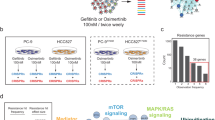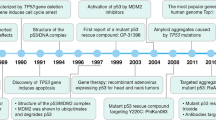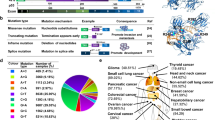Abstract
Human breast cancers that have HER2 amplification/overexpression frequently carry PIK3CA mutations, and are often associated with a worse prognosis. However, the role of PIK3CA mutations in the initiation and maintenance of these breast cancers remains elusive. In the present study, we generated a compound mouse model that genetically mimics HER2-positive breast cancer with coexisting PIK3CAH1047R. Induction of PIK3CAH1047R expression in mouse mammary glands with constitutive expression of activated Her2/Neu resulted in accelerated mammary tumorigenesis with enhanced metastatic potential. Interestingly, inducible expression of mutant PIK3CA resulted in a robust activation of phosphatidylinositol-3-kinase (PI3K)/AKT signaling but attenuation of Her2/Her3 signaling, and this can be reversed by deinduction of PIK3CAH1047R expression. Strikingly, although these Her2+ PIK3CAH1047R-initiated primary mammary tumors are refractory to HER2-targeted therapy, all tumors responded to inactivation of the oncogenic PIK3CAH1047R, a situation closely mimicking the use of a highly effective inhibitor specifically targeting the mutant PIK3CA/p110a. Notably, these tumors eventually resumed growth, and a fraction of them escaped PI3K dependence by compensatory ERK activation, which can be blocked by combined inhibition of Her2 and MEK. Together, these results suggest that PIK3CA-specific inhibition as a monotherapy followed by combination therapy targeting MAPK and HER2 in a timely manner may be an effective treatment approach against HER2-positive cancers with coexisting PIK3CA-activating mutations.
This is a preview of subscription content, access via your institution
Access options
Subscribe to this journal
Receive 50 print issues and online access
$259.00 per year
only $5.18 per issue
Buy this article
- Purchase on Springer Link
- Instant access to full article PDF
Prices may be subject to local taxes which are calculated during checkout






Similar content being viewed by others
References
Arteaga CL, Sliwkowski MX, Osborne CK, Perez EA, Puglisi F, Gianni L . Treatment of HER2-positive breast cancer: current status and future perspectives. Nat Rev Clin Oncol 2011; 9: 16–32.
Baselga J, Swain SM . Novel anticancer targets: revisiting ERBB2 and discovering ERBB3. Nat Rev Cancer 2009; 9: 463–475.
Nahta R, Yu D, Hung MC, Hortobagyi GN, Esteva FJ . Mechanisms of disease: understanding resistance to HER2-targeted therapy in human breast cancer. Nat Clin Pract Oncol 2006; 3: 269–280.
Lerma E, Catasus L, Gallardo A, Peiro G, Alonso C, Aranda I et al. Exon 20 PIK3CA mutations decreases survival in aggressive (HER-2 positive) breast carcinomas. Virchows Arch 2008; 453: 133–139.
Hynes NE, Dey JH . PI3K inhibition overcomes trastuzumab resistance: blockade of ErbB2/ErbB3 is not always enough. Cancer Cell 2009; 15: 353–355.
Berns K, Horlings HM, Hennessy BT, Madiredjo M, Hijmans EM, Beelen K et al. A functional genetic approach identifies the PI3K pathway as a major determinant of trastuzumab resistance in breast cancer. Cancer Cell 2007; 12: 395–402.
Nagata Y, Lan KH, Zhou X, Tan M, Esteva FJ, Sahin AA et al. PTEN activation contributes to tumor inhibition by trastuzumab, and loss of PTEN predicts trastuzumab resistance in patients. Cancer Cell 2004; 6: 117–127.
Perez EA, Dueck AC, McCullough AE, Reinholz MM, Tenner KS, Davidson NE et al. Predictability of adjuvant trastuzumab benefit in N9831 patients using the ASCO/CAP HER2-positivity criteria. J Natl Cancer Inst 2012; 104: 159–162.
Perez EA, Suman VJ, Davidson NE, Gralow JR, Kaufman PA, Visscher DW et al. Sequential versus concurrent trastuzumab in adjuvant chemotherapy for breast cancer. J Clin Oncol 2011; 29: 4491–4497.
Baselga J, Majewski I, Nuciforo PG, Eidtmann H, Holmes E, Sotiriou C et al. PI3KCA mutations and correlation with pCR in the NeoALTTO trial (BIG 01-06) 27 September-1 October 2013. European Cancer Congress: Amsterdam, The Netherlands, Abstract 1859.
Perez EA, Dueck AC, McCullough AE, Chen B, Geiger XJ, Jenkins RB et al. Impact of PTEN protein expression on benefit from adjuvant trastuzumab in early-stage human epidermal growth factor receptor 2-positive breast cancer in the North Central Cancer Treatment Group N9831 trial. J Clin Oncol 2013; 31: 2115–2122.
Engelman JA . Targeting PI3K signalling in cancer: opportunities, challenges and limitations. Nat Rev Cancer 2009; 9: 550–562.
Liu P, Cheng H, Roberts TM, Zhao JJ . Targeting the phosphoinositide 3-kinase pathway in cancer. Nat Rev Drug Discov 2009; 8: 627–644.
Garcia-Echeverria C, Sellers WR . Drug discovery approaches targeting the PI3K/Akt pathway in cancer. Oncogene 2008; 27: 5511–5526.
Liu P, Cheng H, Santiago S, Raeder M, Zhang F, Isabella A et al. Oncogenic PIK3CA-driven mammary tumors frequently recur via PI3K pathway-dependent and PI3K pathway-independent mechanisms. Nat Med 2011; 17: 1116–1120.
Sopasakis VR, Liu P, Suzuki R, Kondo T, Winnay J, Tran TT et al. Specific roles of the p110alpha isoform of phosphatidylinsositol 3-kinase in hepatic insulin signaling and metabolic regulation. Cell Metab 2010; 11: 220–230.
Foukas LC, Claret M, Pearce W, Okkenhaug K, Meek S, Peskett E et al. Critical role for the p110alpha phosphoinositide-3-OH kinase in growth and metabolic regulation. Nature 2006; 441: 366–370.
Ghosh R, Narasanna A, Wang SE, Liu S, Chakrabarty A, Balko JM et al. Trastuzumab has preferential activity against breast cancers driven by HER2 homodimers. Cancer Res 2011; 71: 1871–1882.
Cancer Genome Atlas Network. Comprehensive molecular portraits of human breast tumours. Nature 2012; 490: 61–70.
Jensen JD, Knoop A, Laenkholm AV, Grauslund M, Jensen MB, Santoni-Rugiu E et al. PIK3CA mutations, PTEN, and pHER2 expression and impact on outcome in HER2-positive early-stage breast cancer patients treated with adjuvant chemotherapy and trastuzumab. Ann Oncol 2012; 23: 2034–2042.
Razis E, Bobos M, Kotoula V, Eleftheraki AG, Kalofonos HP, Pavlakis K et al. Evaluation of the association of PIK3CA mutations and PTEN loss with efficacy of trastuzumab therapy in metastatic breast cancer. Breast Cancer Res Treat 2011; 128: 447–456.
Cizkova M, Dujaric ME, Lehmann-Che J, Scott V, Tembo O, Asselain B et al. Outcome impact of PIK3CA mutations in HER2-positive breast cancer patients treated with trastuzumab. Br J Cancer 2013; 108: 1807–1809.
Chandarlapaty S, Sawai A, Scaltriti M, Rodrik-Outmezguine V, Grbovic-Huezo O, Serra V et al. AKT inhibition relieves feedback suppression of receptor tyrosine kinase expression and activity. Cancer Cell 2011; 19: 58–71.
Serra V, Scaltriti M, Prudkin L, Eichhorn PJ, Ibrahim YH, Chandarlapaty S et al. PI3K inhibition results in enhanced HER signaling and acquired ERK dependency in HER2-overexpressing breast cancer. Oncogene 2011; 30: 2547–2557.
Ursini-Siegel J, Hardy WR, Zuo D, Lam SH, Sanguin-Gendreau V, Cardiff RD et al. ShcA signalling is essential for tumour progression in mouse models of human breast cancer. EMBO J 2008; 27: 910–920.
Yuan TL, Choi HS, Matsui A, Benes C, Lifshits E, Luo J et al. Class 1A PI3K regulates vessel integrity during development and tumorigenesis. Proc Natl Acad Sci USA 2008; 105: 9739–9744.
Hanker AB, Pfefferle AD, Balko JM, Kuba MG, Young CD, Sanchez V et al. Mutant PIK3CA accelerates HER2-driven transgenic mammary tumors and induces resistance to combinations of anti-HER2 therapies. Proc Natl Acad Sci USA 2013; 110: 14372–14377.
Garrett JT, Olivares MG, Rinehart C, Granja-Ingram ND, Sanchez V, Chakrabarty A et al. Transcriptional and posttranslational up-regulation of HER3 (ErbB3) compensates for inhibition of the HER2 tyrosine kinase. Proc Natl Acad Sci USA 2011; 108: 5021–5026.
Chakrabarty A, Sanchez V, Kuba MG, Rinehart C, Arteaga CL . Feedback upregulation of HER3 (ErbB3) expression and activity attenuates antitumor effect of PI3K inhibitors. Proc Natl Acad Sci USA 2012; 109: 2718–2723.
Siegel PM, Ryan ED, Cardiff RD, Muller WJ . Elevated expression of activated forms of Neu/ErbB-2 and ErbB-3 are involved in the induction of mammary tumors in transgenic mice: implications for human breast cancer. EMBO J 1999; 18: 2149–2164.
Miron A, Varadi M, Carrasco D, Li H, Luongo L, Kim HJ et al. PIK3CA mutations in in situ and invasive breast carcinomas. Cancer Res 2010; 70: 5674–5678.
Stachler MD, Rinehart EM, Garcia E, Lindeman NI . PIK3CA mutations are common in many tumor types and are often associated with other driver mutations. Appl Immunohistochem Mol Morphol e-pub ahead of print 5 June 2015.
Engelman JA, Chen L, Tan X, Crosby K, Guimaraes AR, Upadhyay R et al. Effective use of PI3K and MEK inhibitors to treat mutant Kras G12D and PIK3CA H1047R murine lung cancers. Nat Med 2008; 14: 1351–1356.
Engelman JA, Luo J, Cantley LC . The evolution of phosphatidylinositol 3-kinases as regulators of growth and metabolism. Nat Rev Genet 2006; 7: 606–619.
Baselga J, Verma S, Ro J, Huober J, Guardino E, Fang L et al. Relationship between tumor biomarkers (BM) and efficacy in EMILIA, a phase III study of trastuzumab emtansine (T-DM1) in HER2-positive metastatic breast cancer (MBC). Proceedings of 104th Annual Meeting of the American Association for Cancer Research 6–10 April 2013. AACR: Washington, DC, Philadelphia (PA).
Gunther EJ, Belka GK, Wertheim GB, Wang J, Hartman JL, Boxer RB et al. A novel doxycycline-inducible system for the transgenic analysis of mammary gland biology. FASEB J 2002; 16: 283–292.
Acknowledgements
We thank Dr Roderick Bronson and the Dana-Farber/Harvard Cancer Center Rodent Histoplathology Core for histopathological analyses. We thank L. Chodosh (University of Pennsylvania School of Medicine) for providing MMTVrtTAmice. This work was supported by the Susan G. Komen Breast Cancer Foundation CCR12225834 (HC), Susan G. Komen Breast Cancer Foundation (IEK), Breast Cancer Research Foundation (NUL, EPW and JJZ), ACS grant CRP-07-234-06-COUN (CLA), NIH grants CA187918 (TMR and JJZ), CA172461-01 (JJZ) and 1P50CA168504 (TMR, IEK, EPW, NUL and JJZ).
Author information
Authors and Affiliations
Corresponding authors
Ethics declarations
Competing interests
TM Roberts is a consultant of Novartis and has received research grant from Novartis. EP Winer has received research grants from Genentech and Roche. IE Krop is a consultant of Amgen and he has received research funding from Genentech. NU Lin has received research grants from Genentech, Array Biopharma, GlaxoSmithKline, Kadmon and Novartis. The other authors declare no conflict of interest.
Additional information
Supplementary Information accompanies this paper on the Oncogene website
Supplementary information
Rights and permissions
About this article
Cite this article
Cheng, H., Liu, P., Ohlson, C. et al. PIK3CAH1047R- and Her2-initiated mammary tumors escape PI3K dependency by compensatory activation of MEK-ERK signaling. Oncogene 35, 2961–2970 (2016). https://doi.org/10.1038/onc.2015.377
Received:
Revised:
Accepted:
Published:
Issue Date:
DOI: https://doi.org/10.1038/onc.2015.377
This article is cited by
-
Efficacy of immunotherapy in HER2-mutated non-small cell lung cancer: a single-arm meta-analysis
Journal of Cancer Research and Clinical Oncology (2024)
-
PIK3CA hotspot mutations p. H1047R and p. H1047L sensitize breast cancer cells to thymoquinone treatment by regulating the PI3K/Akt1 pathway
Molecular Biology Reports (2022)
-
Synergism between the phosphatidylinositol 3-kinase p110β isoform inhibitor AZD6482 and the mixed lineage kinase 3 inhibitor URMC-099 on the blockade of glioblastoma cell motility and focal adhesion formation
Cancer Cell International (2021)
-
A microfluidic assay for the quantification of the metastatic propensity of breast cancer specimens
Nature Biomedical Engineering (2019)



